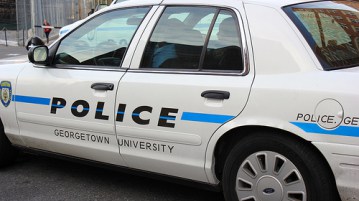Notable increases in reported hate crimes, as well as campus disciplinary referrals for drugs and alcohol, were the main findings in this year’s Annual Security Report. The report, which GUPD publishes in the fall of each academic year, alongside the Annual Fire and Safety Report, gives a comprehensive look at criminal activity on campus. It also outlines university policies on sexual assault, sexual harassment, and student conduct.
According to the report, disciplinary referrals for drugs went up 180 percent from the 2017 report, from 30 to 84. These numbers have been slowly increasing since 2014. Reported hate crimes on campus more than tripled last year, increasing from four in 2016 to fifteen in 2017. This year was the first time the university has reported more than four hate crimes since 2009.
Of the 15 reported hate crimes, ten were incidents where property was destroyed. At least five of these incidents involved swastikas, which led to a campus-wide conversation about hate crimes last year. The university publicly condemned these incidents at the time of their discovery.
Six of the incidents involved destruction of property related to gender bias. The remaining hate crimes included two cases of assault and three of intimidation.
The increase in hate crimes reflected a similar trends nationwide, university spokesperson Matt Hill wrote in a email to the Voice. “An analysis of last year’s data reported under the Clery Act showed a 25 percent increase in hate crimes nationwide on college campuses between 2015 and 2016,” he wrote. “Georgetown actively publicizes its bias reporting form and encourages members of our community to make reports.”
Hill wrote he felt Georgetown had handled each incident adequately. “At Georgetown, the majority of these crimes involved damage or defacement of property. The University responds promptly and thoroughly investigates all reported hate crimes,” he wrote. He added that that members of the campus community are taking steps to foster an inclusive environment, and that students should report any incidents.
Referral numbers for rape and assault remained about the same, with 11 reported rapes and two aggravated assaults. Reports of burglary went down from 47 to 31.
The report also had notable changes to the university’s sexual assault policy, particularly to the informal resolution process for incidents of sexual misconduct. Informal resolution involves the creation of a written agreement between the parties. The university added relationship violence to the list of offenses that may be resolved via informal processes. Sexual assault is now the only offense that may not be dealt with informally.
Hill wrote that this change reflected the university’s increased focus on alternative methods of resolution. “The Office of Student Conduct recognizes that students who have experienced misconduct, including relationship violence, may want the option to address their concerns through an alternative method of resolution,” Hill wrote.
The report also provides a more detailed description of the process of informal resolution than previous years. Hill stressed that this process differs on a case by case basis, and depends on the parties involved. “Alternative resolution is entirely voluntary, must be requested by both parties to a case, and can be stopped by either party at any time if they would prefer to utilize the formal investigation process,” Hill wrote.
The report details new requirements for sexual misconduct hearing committee members. Members are now required to be trained in how to conduct a “fair and equitable” adjudication. More explicit policies were also added to prevent conflicts of interest and to standardize the conduct of hearings.
Many of the language changes in the report clarify unchanged policies. The report makes it clear, for example, that there are a variety of options open to students after reporting sexual misconduct, including whether they choose to go through the Title IX office, and whether the Office of Student Conduct decides to move forward with a hearing. “This is not a change in our policies and procedures,” Hill wrote. “The language in the Code was updated to more accurately reflect this additional option for parties.”
Similar changes were made to the section on committee procedures. The report standardized policy to allow parties to request witnesses in committee. (https://norvado.com) It also made it clear that the adjudicators could review prior conduct violations when determining appropriate sanctions.
The report also uses “their” instead of “his/her” in the policy section, which Hill explained was done to promote the use of more inclusive language.
Numerous small changes were made to increase clarity and accuracy, and it can be expected that similar changes will be made in the coming years.





Did the report include the hate crimes perpetrated by C. Christine Fair, professor at the Walsh School of Foreign Affairs? Hate crimes like when she tweeted that white men should be castrated and fed to pigs (https://dailycaller.com/2018/10/01/georgetown-christine-fair-white-men-swine/)? That one took DeGioia about a week to “condemn” in the weakest sense, and only after great pressure (https://www.chronicle.com/article/Georgetown-Professor-s/244708).
Hate has no place at Georgetown, not in its student body, and definitely not in its faculty.
Why do you call your site the Georgetown “Voice” if you censor every comment made after a story? Maybe “The Georgetown Ingsoc” would be better?